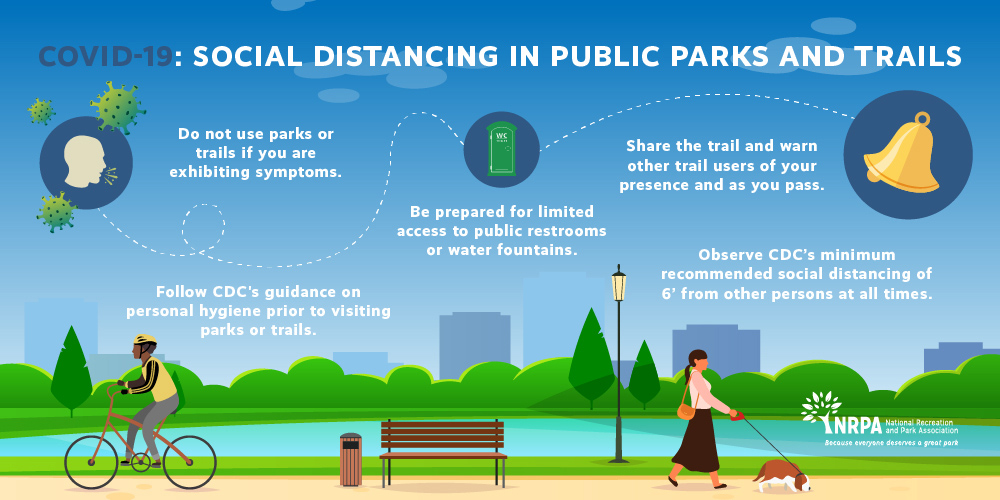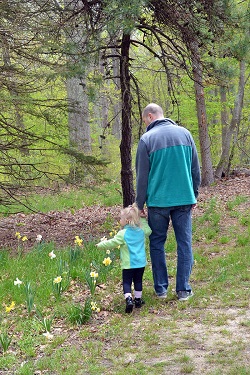Getting out to the parks is good for your physical and mental health. Benefits of exercising in the outdoors include:
- Lowers blood pressure and reduces stress
- Improves mood and reduces depression and anxiety
- Enhances self-esteem
- Connects you with nature
- Invigorates and provides more energy for the mind and body
- Helps you to fall asleep and improve the quality of your sleep

Staying safe in the parks is of upmost importance. Social distancing is the practice of reducing close contact between people to slow the spread of infections or diseases.
In places where there are no restrictions on the use of local parks, trails and open spaces, we encourage all users to follow these recommendations:
- Refrain from using parks or trails if you are exhibiting symptoms of an illness.
- Follow CDC’s guidance on personal hygiene such as washing your hands frequently prior to and after use of parks or trails.
- Wear a face covering in areas where you cannot maintain social distancing.
- While on trails, stay on your side of the trail and follow directional signs if applicable. Warn other users of your presence as you pass and step aside to let others pass.
- Observe CDC’s minimum recommended physical distancing of 6-8 feet from other individuals at all times. If this is not possible, users should find an alternate location or depart that space.
- Avoid group gatherings.
Tick prevention:
 Use an insect repellent with 20% or more DEET, Picaridin or IR3535 on exposed skin and clothing. Or, treat clothing (not skin)—especially pants, socks and shoes—with Permethrin. Always follow product instructions.
Use an insect repellent with 20% or more DEET, Picaridin or IR3535 on exposed skin and clothing. Or, treat clothing (not skin)—especially pants, socks and shoes—with Permethrin. Always follow product instructions.- Wear light-colored clothing to spot ticks more easily.
- Wear long pants tucked into socks (tape this area so ticks can’t crawl under). Wear long-sleeved shirt, tucked into pants. Wear a hat for added protection.
- Walk in the center of trails to avoid overhanging branches, grass and brush. Don’t sit on logs.
- Avoid tick-infested areas–such as tall grass, shrubby areas and leaf litter–especially during April - July (including at the beach).
- After being outdoors, remove clothing and wash/dry at high temperature.
- Inspect yourself carefully for ticks during and after being outdoors.
- Inspect your dogs for ticks. Dogs can also get Lyme Disease and other tick-borne illnesses.(Ask your veterinarian how to protect your pet.)
- Shower within two hours of being outdoors to help rid your body of ticks
- Carefully remove attached ticks. (See instructions on website below). The more quickly you remove them, the less likely they can transmit disease. Save for later identification/testing.
- Call your doctor if you develop symptoms after a tick bite such as: rash, fever, head/muscle aches, joint pain, tiredness.
- Learn more about:
Theft Advisory:
It only takes a thief thirty minutes to break into a vehicle. Be sure to:
- Lock car
- Take keys
- Hide valuables
- Notify Park Rangers of any suspicious activity in parking lots. To reach a Park Ranger, contact the County emergency communications center at 732-577-8700.